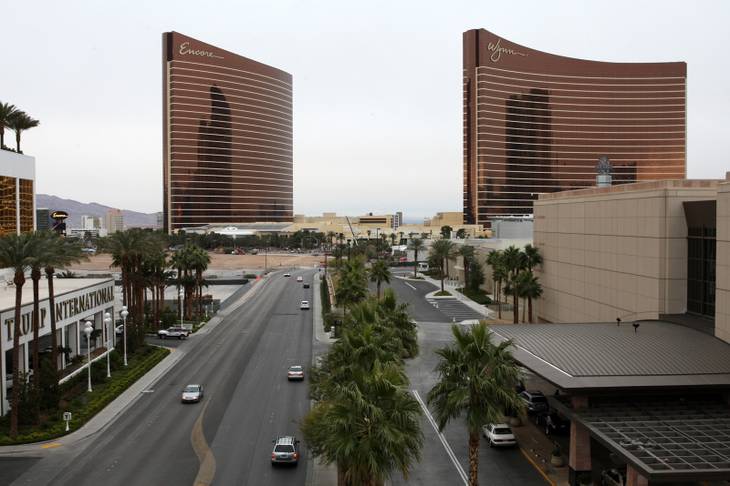Steve Wynn’s revolutionary policy of requiring hundreds of card dealers to share tips with supervisors does not comply with Nevada law, a state judge has ruled.
Clark County District Court Judge Kenneth Cory this week ruled that Michael Tanchek, at the time Nevada’s labor commissioner, erred last year when he found the Wynn tip-pooling policy doesn’t violate state law.
An attorney for Wynn Resorts Ltd. on Thursday said the company would appeal Cory’s order — setting up a showdown on the issue at the Nevada Supreme Court, where the parties have predicted the case would eventually end up.
“The Wynn disagrees with the order and intends to appeal the District Court’s rulings to uphold the more appropriate rulings and reasoning of the Labor Commissioner,” said Las Vegas attorney Gregory Kamer.
Ruling Tuesday in a lawsuit filed by dealers challenging Tanchek’s ruling, Cory wrote that Wynn casino supervisors called boxmen and “Casino Service Team Leads,” formerly floor supervisors and pit managers, can’t share in dealers’ tips.
Leon Greenberg, an attorney for dealers challenging the tip-sharing policy, said that if Cory’s ruling is upheld it will allow him to demand the return of some $30 million he believes has been wrongly taken from the dealers since 2006. Cory’s ruling will allow the dealers to pursue their claims as a class action — a development that protects individual workers from retaliation should they complain about the policy, Greenberg said.
Tip sharing is common among workers in the same job classification, dealers or waitresses for instance. It’s uncommon — but not unheard of — to have supervisors share in these tips.
While tip sharing between dealers and supervisors has been a longtime practice in at least two smaller casinos in Nevada, it’s implementation by Steve Wynn in 2006 at Wynn Las Vegas and later at Encore was a first for the Las Vegas Strip. Wynn said he wanted to equalize the incomes of dealers and their supervisors to recruit more supervisors. On the Strip, dealers typically make more than their bosses because of hefty tips.
Dealers complained the Wynn policy had deprived them of money they earned and had reduced their incomes.
The key legal question was whether Wynn Las Vegas and Encore received an unauthorized “direct benefit” by diverting tips from the dealers to the supervisors.
Attorneys for Wynn insisted during an August hearing that the company received no direct benefit as it was simply redistributing money among the casino staff and that the dealers’ supervisors were entitled to share in tips as they have substantial customer satisfaction duties.
Wynn’s attorney, Kamer, also argued a minority of dealers are behind the legal challenge and the vast majority of the company’s approximately 1,000 dealers want nothing to do with the dispute.
Kamer further had urged Cory not to legislate from the bench, pointing out the Nevada Legislature has had plenty of opportunities to explicitly outlaw such tip-sharing arrangements but has not done so.
Attorneys for the dealers — who say some $5 million per year is being diverted from dealers to supervisors — insisted Wynn receives a direct benefit since the diverted tip dollars are dollars that Wynn as a corporation doesn’t have to come up with to help pay for the supervisors’ raises.
The bottom line is that the policy boosts Wynn’s profit at the expense of the dealers, attorneys for the dealers complained.
Cory, in Tuesday’s ruling, sided with the dealers in the legal dispute, and he cited a lack of support for Wynn’s position in Nevada Supreme Court case law.
“Quite simply, the Nevada Supreme Court has never allowed a mandatory tip-pooling policy that extends beyond the dealer-only pool,” Cory wrote in his ruling.
“This court is unprepared to say that the tip-pool in the instance case, one that allows boxpersons and Casino Service Team Leads (CSTL) to share in the tip pool with dealers, is one that the Supreme Court anticipated” in a previous case, Cory wrote in his ruling. “To so hold in the face of the demonstrable evidence of the direct economic benefit to Wynn would be to eviscerate the meaning of ‘direct benefit to an employer.’ Therefore, Wynn is prohibited from including boxmen and CSTLs in the tip pooling agreement.”
The Wynn policy was aimed at boosting the pay of casino supervisors from about $60,000-$65,000 to $85,000-$90,000, or about what the dealers were making before the change, attorneys have said.
Wynn had provided the supervisors with a $5,000 raise, with the rest of their raise coming from the dealers’ tip pool, dealers’ attorney Greenberg said during the August ruling.
On Thursday, Greenberg said Cory’s ruling was “direct and straight-forward.”
“He’s saying it’s OK to have tip sharing — but with people in different job classifications it’s not appropriate,” Greenberg said.
